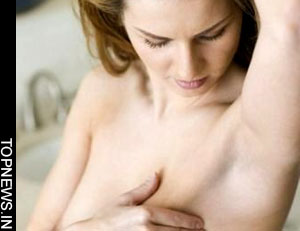Intervention proves effective in increasing correct breast self-exams
 Washington, April 30 : In a new study, researchers have found that a brief intervention program boosted the number of women correctly performing breast self- exams by tenfold.
Washington, April 30 : In a new study, researchers have found that a brief intervention program boosted the number of women correctly performing breast self- exams by tenfold.
The Kaiser Permanente Center for Health Research study is one of the first to show intervention programs can be effective in increasing breast self-exams.
Researchers said that this program is a model that can be used to encourage patients'' participation in their own health care, and can be modified to educate patients about other self-screening techniques for cancers such as melanoma and testicular cancer.
"Many women avoid breast self-exams because they are worried about doing them correctly; however, our study showed that with a relatively simple intervention, women can learn the proper technique, and once they feel confident they will continue to do their exams." said Nangel Lindberg, Ph. D., lead author and investigator at the Kaiser Permanente Center for Health Research in Portland, Ore.
"This is an excellent opportunity for women to participate in their own health care. Self-exams allow women to become familiar with their breasts, so they can report any changes to their health care provider," Lindberg added.
The study, conducted from 1998 through 2001, involved more than 600 women, aged 40 to 70, who had a negative mammogram screening within the last two months.
The women were randomized to a group that received dietary counseling with no mention of BSE, or the study group that received a 30 to 45-minute counseling session in which they watched an educational video, practiced BSE on a silicone model, and discussed possible barriers to doing self-
exams.
At one and two months after the session, the women also received follow-up phone calls. Before the intervention about six percent of women in both groups were performing adequate self exams - defined as lasting at least five minutes, occurring every month, and fulfilling specific criteria taught during the counseling sessions.
One year after the program, 59 percent of women in the intervention group were performing adequate self-exams, compared to only 12 percent of women who received dietary counseling.
The study is published in the American Journal of Health Promotion. (ANI)